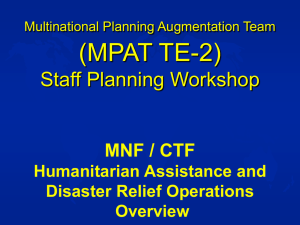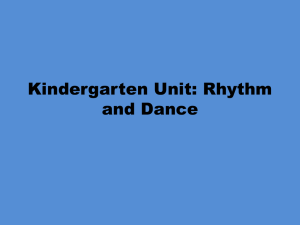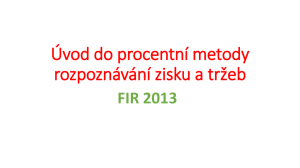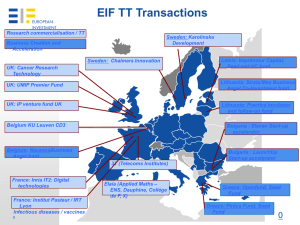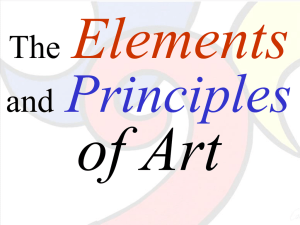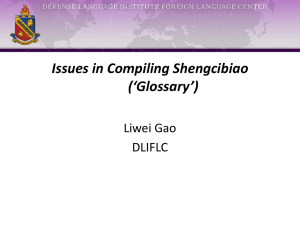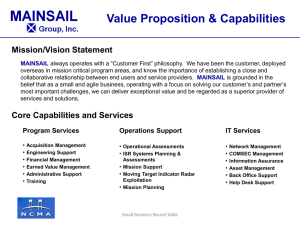B2C2WG 7-Minute Drills and TF One Team Battle Rhythm
advertisement
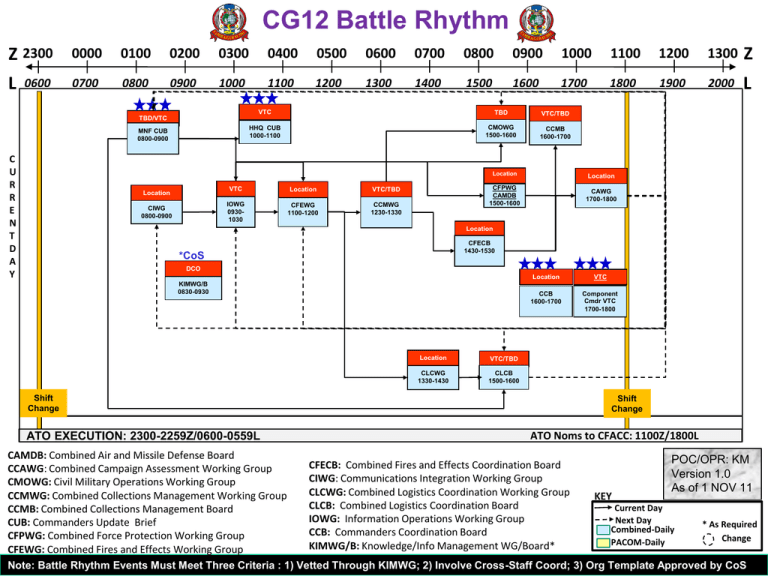
CG12 Battle Rhythm Z 2300 0000 0100 0200 0300 0400 0500 0600 0700 0800 0900 1000 1100 1200 1300 Z L 0700 0800 0900 1000 1100 1200 1300 1400 1500 1600 1700 1800 1900 2000 L 0600 VTC TBD VTC/TBD HHQ CUB 1000-1100 CMOWG 1500-1600 CCMB 1600-1700 TBD/VTC MNF CUB 0800-0900 C U R R E N T D A Y Location CIWG 0800-0900 VTC Location VTC/TBD IOWG 09301030 CFEWG 1100-1200 CCMWG 1230-1330 Location Location CFPWG CAMDB 1500-1600 CAWG 1700-1800 Location CFECB 1430-1530 *CoS DCO KIMWG/B 0830-0930 Location VTC/TBD CLCWG 1330-1430 CLCB 1500-1600 Location VTC CCB 1600-1700 Component Cmdr VTC 1700-1800 Shift Change ATO EXECUTION: 2300-2259Z/0600-0559L CAMDB: Combined Air and Missile Defense Board CCAWG: Combined Campaign Assessment Working Group CMOWG: Civil Military Operations Working Group CCMWG: Combined Collections Management Working Group CCMB: Combined Collections Management Board CUB: Commanders Update Brief CFPWG: Combined Force Protection Working Group CFEWG: Combined Fires and Effects Working Group Shift Change ATO Noms to CFACC: 1100Z/1800L CFECB: Combined Fires and Effects Coordination Board CIWG: Communications Integration Working Group CLCWG: Combined Logistics Coordination Working Group CLCB: Combined Logistics Coordination Board IOWG: Information Operations Working Group CCB: Commanders Coordination Board KIMWG/B: Knowledge/Info Management WG/Board* KEY POC/OPR: KM Version 1.0 As of 1 NOV 11 Current Day Next Day Combined-Daily PACOM-Daily * As Required Change Note: Battle Rhythm Events Must Meet Three Criteria : 1) Vetted Through KIMWG; 2) Involve Cross-Staff Coord; 3) Org Template Approved by CoS Commander’s Update Brief (CUB) Purpose: To provide MNF Commander, components and staff with campaign progress and updates from selected staff and assigned components. Inputs: • Commander’s Update brief from MNF staff • Components current operational briefs • Guidance from Higher Headquarters of each MNF country; for the U.S, the HHQ is USPACOM Outputs: • Commander’s guidance • Daily Intentions Message (DIM) • De-Confliction decisions Key Tasks: • Review progress of campaign assessment • Receive commander’s guidance on planning efforts or execution of operations Chair: MNF Commander Facilitator: MNF Chief of Staff Frequency/Location: Daily / Room TBD Membership: MNF Cmdr; Deputy MNF commander; Chief of Staff; Staff Directors (C1, C2, C3, C4, C5, C6, C7, C8; special staff (PAO, JAG; and MNF components commanders or their LNOs) POC: C5 Return to Battle Rhythm Communications Integration Working Group (CIWG) Purpose: Synchronize, coordinate, de-conflict, and monitor multinational force’s strategic communication actions, images, and words to support the achievement of the participating nations’ overall strategic objectives and end states. Inputs: • STRATCOM Guidance (National) • JTF Guidance and Intentions / FRAGO (CC) • Public Affairs Guidance (PAO) • Campaign Assessment (JTF) (CAWG) • Intelligence Updates (C2) • OSINT analysis (Media Roll-up) (C2) • CMO updates (CMOWG) • Approved CPOTF products (CPOTF) • Media Assessment Outputs: • Communications Integration Plan • Campaign Themes and Messages • Inputs/recommendations to IOWG Key Tasks: • MCI coordinates programs, plans, themes, messages, and products with other instruments of national power in a multinational effort • Publish a communication integration plan • Monitor and assess to assist in the decision-making cycle • Ensure dissemination of communication integration to subordinate commanders for consideration in planning • Obtain approval from MNF for Themes and messages • Coordinate national PA and MCI guidance given to each respective nation’s military forces Chair: C5 Facilitator: Public Affairs Officer/Information Operations Officer Frequency/Location: Daily /PAO spaces Membership: C5, Public Affairs, Information Operations, Legal, Pol-Mil, CMO rep, C3, C2, CPOTF, SOF, country liaisons, POLAD POC: J39 IO Planner Return to Battle Rhythm Information Operations Working Group (IOWG) Purpose: Synchronize, coordinate, de-conflict, monitor PSYOP, EW, OPSEC, MILDEC, and CNO with supporting and related (CMO, PA, Strat Com, COMCAM) capabilities, staff elements, subordinate and higher units to ensure a coordinated and efficient effect is achieved. Inputs: • STRATCOM Guidance (National) • Public Affairs Guidance (PAO) • JTF Guidance and Intentions / FRAGO (CC) • INFOCON status (JTF) (C6) • Campaign Assessment (JTF) (CAWG) • Intelligence Updates (C2) • OSINT analysis (Media Roll-up) (C2) • CMO updates (CMOWG) • Component and (EA) EW and PSYOP nominations (non-kinetic targets) (Components) • Approved CPOTF products (CPOTF) Outputs: • Non-lethal targeting guidance (components) • Information Operations (IO) execution matrix (CFEWG) • OPSEC guidance (components) • PSYOP integration plan (CFEWG) • PSYOP product requirements and guidance • Target nominations for non-lethal and influence operations (CFEWG) Key Tasks: • Determine IO target nominations for submission to Target Coordination Board for approval (and inclusion in ATO) • Draft FRAGO input (IO targeting directives) as required • Develop Talking Points for incorporation into Press Releases / Conferences • Ensure dissemination of IO guidance to subordinate commanders for execution planning • Monitor and Assess IO effects on targets to allow for target and product adjustment Chair: C39 Chief Facilitator: Information Operations Officer Frequency/Location: Daily /IO Cell Room (VTC, virtual room for components) Membership: Components, OID reps (Analyst, Collections), C2IN rep, EWO, C5 rep, OMD rep, CMO rep, PA planner, Engineer, PSYOP, Strat Com As required: - SJA, POLAD, Chaplain, Space POC: C39 IO Planner Return to Battle Rhythm Combined Collection Management Working Group (CCMWG) Purpose: Identify, validate, prioritize and manage ISR activities. Track and answer CCTF PIRs. Manages CTF collection requirements. Conducts collection operations management. Direct and manage dissemination process. Inputs: • Components’ Combined Integrated Priority Collection Lists (CIPCLs) • ISR Asset status (Components, National Agency) • Draft Combined Integrated Prioritized Target List (CIPTL) from CFEWG • Identified Intelligence gaps (C-2 staff) • IO Nominations (IOWG) Outputs: • Collection Plan (Components, C-staff) • Collection Emphasis Message (Components, C-staff) • Draft Combined Intelligence Prioritized Collection List (CIPCL) – (Components, CFEB) • Collection Requirement Nominations to National Agencies • ISR Synchronization Matrix (CFACC) Key Tasks: • Manage and account for ISR assets in theater • Draft Collection Plan and Collection Emphasis Message • Create Draft CIPCL • Request additional assets if required • Recommend adjustments to ISR asset basing • Submit requirements for National collection • Monitor dissemination plan and key products Chair: C-2 or Deputy; Facilitator: Collection Manager Frequency/Location: Daily VTC Membership: C-2 analysts, C-3 ISR planners, Component Collection Managers, IO planners, C3 Targets/ Fires, National Agencies, Coalition LNOs, Civil-Military Ops, Space planners, C-5 rep POC: CTF Collection Management Team Return to Battle Rhythm Combined Collection Management Board (CCMB) Purpose: Identify, validate, prioritize and manage ISR activities. Seek approval for CTF Collection Plan. Track and answer CCTF PIRs. Manages CTF collection requirements. Conduct collection operations management. Direct and manage dissemination process. Inputs: • Finalized CIPCLs (Components, C-Staffs) • ISR Asset status (Components) • Combined Integrated Prioritized Target List (CIPTL) from CFEB Outputs: •Approved Collection Plan •Approved Collection Intelligence Prioritized Collection List (CIPCL) to Components •Collection Requirements to National Agencies •Approved ISR Synchronization Matrix to CFACC Key Tasks: • Manage & recommend changes to PIRs • Brief C-2/C-3 on ISR assets status • Seek approval Collection Plan & CIPCL • Submit requests for National collection • Request additional assets if required • Recommend changes to ISR asset basing • Highlight Intel gaps & mitigation plan • Coordinate changes with Components Chair: C-2 and C-3 (co-chair) Facilitator: Collection Manager Frequency/Location: Daily VTC (normally scheduled after CFEB) Membership: C-2 analysts, C-3 ISR planners, Component Collection Managers, IO planners, C-3 Fires, National Agencies, Coalition LNOs POC: CTF Collection Management Team Return to Battle Rhythm Combined Fires and Effects Working Group (CFEWG) Purpose: Identify, validate, de-conflict, and integrate kinetic and non-kinetic fires / prepare decision briefs in preparation for the Combined Fires, Effects, and Collections Board (CFECB). Integrate all Fires with maneuver ISO CTF OPLANS Inputs: • CCIR(s) / EEFI(s) / Intelligence Assessment • Current / future ISR Synchronization Allocation • CUB (Salient) Updates • Fragmentary / Warning Orders (Salient) • ATO (Current) Review + Previous Day’s BDA • TET Review (ISO Current Day CIPTL Approval) • IOWG Synch Matrix • ROEWG Review / Application for 72-96 hour out • CAWG Review / Application for 72-96 hours out • Target nomination Outputs: • Draft CIPCL / Draft CIPTL (CFECB) • Review draft apportionment / guidance for 96 hours • Publication of revisions to CTF FSCM(s), NSL, & RTL, CTL Key Tasks: • Integrate kinetic + non- kinetic Fires • Create Draft CIPTL for Approval • Recommend revisions+NSL,RTL,LTL • Prepare decision brief for CFECB Chair: CTF Fires Officer / Chief Facilitator: CTF Fires Officer / Chief Frequency/Location: Daily / TBD Membership: • Intelligence (Current Op(s), METOC, Targeting) • Components (CFACC,CFLCC, CFMCC, CJOSTF, CMOTF, CBNE, PSYOPS) • C3 Future Operations • C3 Information Operations • C5 Assessments • BMD Coordinator (CFACC LNO) • SJA • Combined Information Bureau (Public Affairs) POC: C3 Return to Battle Rhythm Combined Fires and Effects Coordination Board (CFECB) Purpose: Identify, validate, de-conflict, and integrate kinetic and non-kinetic fires / prepare decision briefs in preparation for the Combined Fires, Effects, and Collections Board (CFECB). Integrate all Fires with maneuver ISO CTF OPLANS De-conflict and prioritize target nominations and ISR collection requirements. Key Tasks: • Public apportionment guildance • Approve Draft CIPTL, NSL, RTL, LTL Chair: DCCTF Facilitator: DCCTF Deliverables (in): • CCIR(s) / EEFI(s) / Intelligence Assessment • Draft CIPCL (FEWG) • Current / future ISR Synchronization Allocation (IOWG) • ATO (Current) Review + Previous Day’s BDA • Draft CIPTL • TET Review (ISO Current Day CIPTL Approval) • Components Deliverables (out): • Approved CIPCL / CIPTL (CCMWG) • Approved AOD apportionment guidance for 72 hours • Approved guidance for 96 hours • Approved revisions to CTF FSCM(s), NSL, & RTL Frequency/Location: Daily / Rm (TBD) Membership: • Intelligence (Current Op(s), METOC, Targeting) • Components (CFACC,CFLCC, CFMCC, CJOSTF, CMOTF, CBNE, PSYOPS) • C3 Future Operations • C3 Information Operations • C5 Assessments • BMD Coordinator (CFACC LNO) • SJA • Combined Information Bureau (Public Affairs) • C4 Sustainment POC: C3 Return to Battle Rhythm Combined Logistics Coordination Working Group Purpose: Staff officer-level coordination and problemsolving forum for MNF logistics issues, including distribution, engineering and medical. Enhances log situational understanding across current ops, future ops and plans time horizons. Inputs: • CLCB direction • CUB, CPG, CAWG, CFEWG, CFPWG, CMOWG info, coordination and requirements • Daily LOG/MED SITREPs from MNF components, and supporting log reports (REPOL, MUREP, MOVREP, as required. • MNF OPORD, FRAGO • Support, supply, & movement priorities Outputs: • Coordinate with C4 reps attending: CAWG (update log assessment areas), CFEWG (ref critical infrastructure/munitions), CFPWG (ref engineering/log services/distribution/HSS) & CMOWG (ref general log requirements/support) • LOGSITREP to HHQ, MNF SITREP input Key Tasks: • Identify log issues requiring senior C4 decision (for CLCB or HHQ) • Coordinate log support to MNF, especially for future ops and plans time horizons. • Review key LOG/MED SITREP data • Anticipate/solicit log problems or shortfalls Chair: MNF C4 Deputy or Log Ops Div Chief Facilitator: C4 Fusion Chief Frequency/Location: Daily/C4 area, chat or telecon for component participation Membership: Primary: C4 key staff, HSS, C1, CPG, C7, Component C4 key staff On request: HHQ J4 staff officers, MNF Legal, C3 Force Flow. POC: C4 Fusion Chief Return to Battle Rhythm Combined Logistics Coordination Board Purpose: Decision forum for MNF logistics issues, including distribution, engineering and medical. Enhances log situational understanding across current ops, future ops and plans time horizons. Inputs: • Log issues requiring decision (from CLCWG) • CUB, CPG, CAWG, CFEWG, CFPWG, CMOWG info, coordination and requirements • Daily LOG/MED SITREPs from MNF components, and supporting log reports (REPOL, MUREP, MOVREP, as required. • MNF OPORD, FRAGO • Support, supply, & movement priorities Outputs: • Key log issues to raise at CUB • C4 direction to reps attending: CAWG (update log assessment areas), CFEWG (ref critical infrastructure/munitions), CFPWG (ref engineering/log services/distribution/HSS) & CMOWG (ref general log requirements/support) • LOGSITREP to HHQ, MNF SITREP input Key Tasks: • Provide decisions on log issues • Raise issues to HHQ for assistance/decision • Approve C4 slides for CUB • Review key LOG/MED SITREP data • Anticipate/solicit log problems or shortfalls Chair: MNF C4 Facilitator: C4 Fusion Chief Frequency/Location: Daily/C4 area, VTC or telecon for HHQ and component participation Membership: Primary: C4 key staff, MNF surgeon, C1, CPG, C7, C8, MNF Component C4 key staff On request: HHQ J4, MNF Legal, C3 Force Flow POC: C4 Fusion Chief Return to Battle Rhythm Civilian Military Operations Working Group (CMOWG) Purpose: Coordinate civil-military support; coordinate civil-military operations with all external agencies, including IO/NGO/UN agencies, non-governmental agencies; Coordinate with key governmental leaders and organizations. Inputs: • MNF Warning order – Commanders Guidance • MNF FRAGO • Civil Information Report – CA BN • Reports and SITREPS from Intergovernmental organizations (IGO) • Campaign Plans and Update Brief (US) • CUOPS/FUOPS Updates • CIGG,IOWG, CCMWG, CLCWG, CLCB, CAWG Outputs: • FRAGO Input/Change of plans/orders and measures (Submit to CUOPS(TF)) • Updates to COIC COP – Civil Information (TF) • Update to Common Operational Picture (COP) • Guidance to CMOC and attached CA/CMO units (FRAGO / CMO Estimate) • Planners of C3 & C5 Key Tasks: • Coordinate CMO support to MNF.. • Co-ordinate with Humanitarian Organizations. • Support ongoing humanitarian operations. • Liaise and coordinate with key military/government leaders in region. • Co-ordinate on the establishment of CMOC. • Manage Civil Information. Chair C-7: • Chief C7 Frequency/Location: Daily / Cell Reps: C2, C3, C4, C5, PAO, IO, C8, another US Governmental Agencies, IO/NGO (if available) POC : C7 Return to Battle Rhythm KIMWG / B Purpose: Manage knowledge sharing processes in order to facilitate situational understanding. Assists the Headquarters Chief of Staff in implementing people, processes and tools necessary to create and share knowledge. Key Tasks: • Review proposed updates to the Battle Rhythm and obtain CoS guidance • Develop and recommend approval of KM directives to the CoS Inputs: •Staff recommended changes to the battle rhythm • Staff issues with tools, processes, and CFEs Chair: KIMO (CoS for KMB as required) Outputs: • KM directives (tools, process and CFEs changes) • Recommended changes to the battle rhythm (KMB) Frequency/Location: As required Facilitator: KM Ops Membership: KM Cell, IMO Cell, Content Manager (portal) POC: KM Return to Battle Rhythm Commander’s Coordination Board (CCB) Purpose: Provide a forum for the MNF Commander to meet with his key leadership in order to discuss planning and operational issues, provide guidance, and make decisions to guide future planning. Key Tasks: • Review progress of current operations • Propose planning decisions requiring MNF commander’s approval Inputs: • Current operations update • CPG update on future planning • Updated Fires, Effects and Collections products Chair: MNF Commander Outputs: • Commander’s planning guidance • De-Confliction decisions • Updated Commander’s estimate Facilitator: MNF Chief of Staff Frequency/Location: Daily / Room TBD Membership: MNF Cmdr; Deputy MNF commander; Chief of Staff; C2, C3, C4, C5 Staff Directors; CPG and OPT Leads POC: C5 Return to Battle Rhythm Campaign Assessment Working Group (CAWG) Purpose: Provide integrated campaign assessment of trends in the operational environment using preestablished measures of effectiveness, measures of performance and associated indicators. Inputs: • Tasks assessment from CcmdC and components • Effects assessment from designated C-code offices of primary responsibility (OPR) • Draft assessment from Campaign Assessment Cell (CAC) Outputs: • Results of the tasks and effects assessment • Operations and Plan Review and Recommendations (OPRR) • Staff validated campaign assessment results to CFEWG, IOWG, CMOWG and any required working groups Key Tasks: • Analyze and validate the results of the CAC assessment • Provide recommendations to the MNF Cmdr via Campaign Assessment Board • Recommend changes to effects, measures of effectiveness and related indicators based on deficiency analysis of the assessment Chair: C5 Facilitator: Senior Assessment Officer Frequency/Location: Daily / Room TBD Membership: C2, C33, C35, C39, C4, C5 CPG, C6, C7, SJA, components, and any other required Subject Matter Experts POC: C5 Return to Battle Rhythm Combined Air and Missile Defense Board (CAMDB) Purpose: Recommend a Course of action to the Protected Asset List (PAL) Inputs: • Approved CAL/DAL • Recommended VAL • Equipment status report • Approved POP/PAL • INTSUM (TBM, SOF) • Patriot Theater float equipment • SAMSTRATREP (Missile status) • TAMD Concept of Operations • CTF COP • CAMDWG results (proposed POP/PAL with CVT, RFF) Outputs: • Proposed POP/PAL/VAL • FRAGO for any changes required. (i.e. change in POP) Key Tasks: • Approve FRAGO • Approve AMD protection level by phase Chair: C3 AMD Lead Facilitator: C3 AMD Lead Frequency/Location: As Required / DCO & Conf Room Membership: ADA BDE Rep, 94th AAMDC, CFMCC Rep, CFACC Rep, CFLCC Rep, C2, C3, C4 POC: C3 Return to Battle Rhythm Combined Force Protection Working Group Purpose: Plans, coordinates, and assess force protection (FP) for the MNF command. Inputs: • CDRs Guidance • INTSUM • SIG Events • Current and Emerging Threats • CTF approved CAL/DAL • Component Recommended CAL/DAL • BMD Assessment • Approved Priorities of Protection (POP) and PAL • HSS Issues • CBRNE Events Outputs: • Recommended changes to FPCONs • Updated FP Assessment • FRAGOs for FP Changes • FP vulnerability assessments • Updated analysis on POP/PAL • Proposed POP/PAL Key Tasks: • Synchronize protection levels by phase • Prepare/update FPCONs for approval by CMNF • Delineate force protection priorities (Component, AO) • Monitor Intelligence and operations for issues or situation that may affect the MNF FP Posture • Assist and advise multinational force units in conducting FP vulnerability assessments Chair: DEP CoS Facilitator: MNF AT/FP Officer Frequency/Location: TBD Membership: AT/FP Officers, Component Reps, CAMDWG Rep, IO, C2, C3, C4, C5, C8, BMD, SJA, Health/Surgeon, Safety, Engineer, others as required POC: C3 Return to Battle Rhythm
